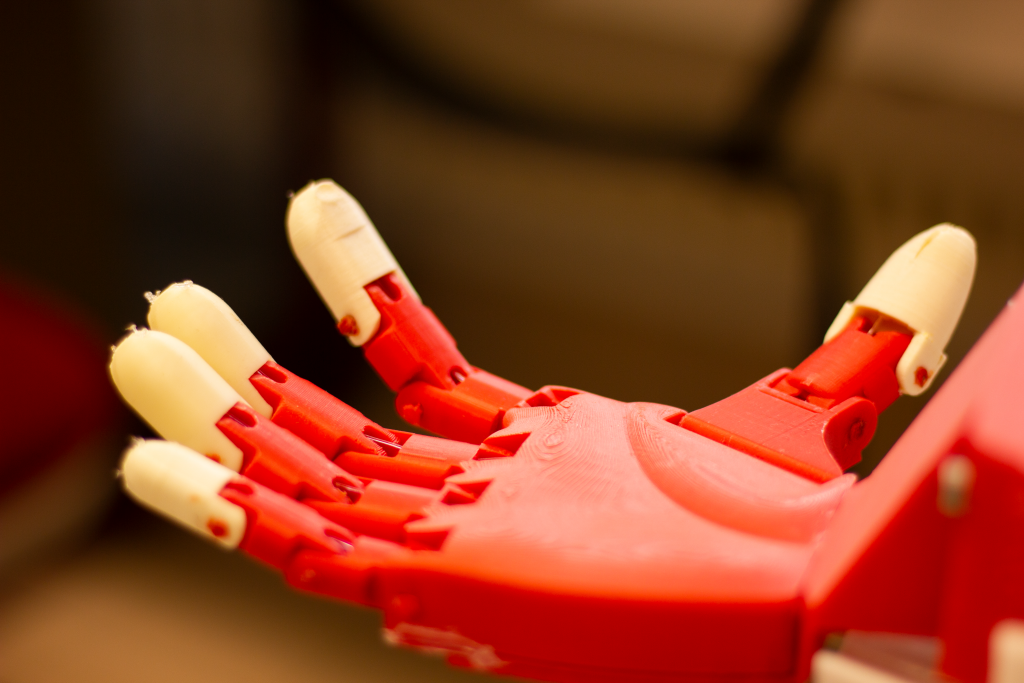Open horizons for digital modernity
What will the world of tomorrow look like? Compared to yesterday, it can be assumed that the moments of digitization and automation will continue, as well as the penetration of our daily world and the world of work with very complex devices and applications. Accordingly, it appears that technological innovations are useful underpinnings and extensions of our choices of work and communication, whose future potential is difficult to estimate at present.
Changes are only slowly taking shape, but they are already causing significant reductions in daily life, as evidenced by the importance of smartphones. But the shift is increasingly being felt in other areas such as logistics automation and support robots in care.
Interdisciplinarity as key
People – Interaction – Technology: This triangular relationship is a research focus at Schmalkalden University of Applied Sciences. Innovative technologies such as bots, interfaces and applications can support people in their daily lives as well as help them in their working lives. Much of the monotonous industrial routine work and many of the cargo transportation operations could be taken over by the autonomous machines of the future. In short, it is about making people’s work easier and making their lives easier. In order for artistic performances to be able to exploit their potential, they must be accepted by people and integrated into their lives, work and actions. In order to understand the relationship between people and technology, an interdisciplinary approach is required, which collaboratively combines different disciplines such as mechanical engineering, computer science, and psychology. The diversity of their points of view and methods makes it possible to illuminate the phenomenon from different points of view and shed light on its aspects. The disciplines are thus constructively intertwined in their leading epistemological concerns – the relationship between people, interaction and technology.
between man and machine
The possibilities of technical innovation converge with the experiences and values of individuals: How is trust created? Or weaker: How can defensive influences be avoided and fear of contact reduced? What is the optics, and what speed do tech devices such as delivery robots have to have in order not to be seen as an obstacle in traffic, for example? What are the thresholds that hinder interaction, and what are the necessary thresholds? But also the opposite: how can technology learn to better evaluate human behavior and how to react more appropriately? The relationship of communicative interaction between man and machine is precisely the focus of research at Schmalkalden University of Applied Sciences.
Aside from the question of technical feasibility, the way individuals and societies react to the changes and upheavals associated with new technologies is relevant: what is possible and technically feasible should be as much a focus as an understanding of how people deal with it. Machines, what they expect from the solutions provided, and what makes it easier for them to resort to machine support. So MIT’s focus should not only be on innovative devices and applications, but also on the individual and social use of these technologies.
Current research projects:
Professor Frank Schrodel
(Professor of Automation Technology and Robotics)
Robotics in the City – A set of acceptance criteria for the use of small autonomous mobile phones
bmdv.bund.de
Professor Andreas Wenzel
(Professor of Embedded Systems and Technical Informatics)
Intelligent methods for automatic and traceable analysis of comprehensive infrastructure, traffic and environmental measurement data
Rebound:
Professor Sebastian Ulrich
(Professor of Business Administration)
An investigation into the impact of sleep on social media:
How do people initially feel distrustful of information that comes from suspicious sources, but after a certain time they still believe it? What are the consequences of this influence in the field of social media? So what is the remarkable impact of fake news that people encounter at a distance?

“Certified tv guru. Reader. Professional writer. Avid introvert. Extreme pop culture buff.”







More Stories
Samsung Quantum Dot TV: Art meets technology
Pitch: €56m for energy startup Reverion
Plastoplan: Plastics for Energy Transition